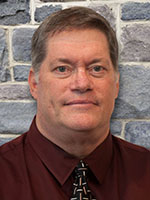Biography
Zane Scott is Vice President of Professional Services at Vitech. For the past 25 years, Scott has built a skill set which enables him to provide insight and guidance to individuals and companies as they improve organizational processes, and methodologies. He is a skilled platform and web presenter who enjoys connecting with audiences of all backgrounds and perspectives and has taught systems engineering methodology in a variety of settings. He is an accomplished writer on systems engineering topics, having authored numerous blog articles and co-authored Vitech’s book A Primer for Model-Based Systems Engineering. He is the developer and presenter of the 20-webinar course “Leadership for Systems Engineers” sponsored by the International Council on Systems Engineering (INCOSE).
Before coming to Vitech in 2009, Scott was a management consultant in the areas of organizational development, process analysis and conflict management. He is a trained hostage negotiator and interventional mediator. For more than six years immediately prior to joining Vitech he worked on DoD contracts analyzing and improving processes and applying best practice models (e.g. – CMMI, Lean Six Sigma) using MBSE and Vitech’s CORE™ to provide the modeling support. He has taught leadership, communication and conflict management skills in settings ranging from the college classroom to professional development seminars.
Scott holds a BA in economics from Virginia Tech and a JD from the University of Tennessee. At Virginia Tech he was an active student leader who was inducted into the Virginia Tech Circle of Omicron Delta Kappa, the International Leadership Honorary Fraternity. He also did graduate study in counseling at Virginia Tech and in business management at the University of Tennessee.
Zane is a member of the American Society of Training and Development, the International Association of Hostage Negotiators, and the International Council on Systems Engineering (INCOSE), where he sits on the Corporate Advisory Board.
Presentation Topics
Model-Based Systems Engineering (One Day, Half Day)
The classic systems engineering domains (Requirements, Behavior, Architecture, and Testing) are all typically treated as and managed separately. Complexity and size often necessitate the use of a tool or tools to manage the domain. Tools are selected in each area and teams of “experts” manage the development and changes that take place. Problems arise because the domains are not actually discrete and unrelated. As the system design evolves, domains impact each other.
Many methods have emerged as attempts to answer the problem of developing the system as a system. From the plan-driven discipline of the classic waterfall approaches to the emphasis on responsiveness and flexibility in the agile school, these methods have all sought to produce a system solution for customer problems. All, however, have created their own set of problems and limitations.
This course discusses an approach to system design and improvement that is more agile than the traditional plan-driven methods and, at the same time, maintains the disciplined systems view avoiding the pitfalls of component engineering. We will discuss the concept of systems thinking and approach and the importance of understanding the business process components of the system. We will explore the delivery of capability that is value-adding for the customer in a meaningful time frame without losing sight of the system context.
Half-day format
A shorter treatment of the one-day MBSE course, the half-day version treats the topics covered in the longer course in a survey fashion designed to raise awareness, rather than develop understanding at depth.
Leadership for Systems Engineers (One Day, Half Day, One Hour)
This seminar offers a survey of important leadership topics for technical professionals engaged in leadership roles, whether formally or informally. It is designed to cover the fundamental skill sets for leaders (communication, conflict management, and decision-making) at some length and to survey a number of other topics as well (e.g., leadership styles, emotional intelligence, motivation and trust, organizational culture). The seminar is organized for 8 hours of contact including the liberal use of interactive Q&A sessions. Participants will come away with an awareness of the basic concepts of the topics covered and a starting reference point for pursuing them further.
Half-day format
This seminar treats the basic fundamental leadership skills sets (communication, conflict management, and decision-making) in a survey format designed to introduce basic concepts and suggest resources for the pursuit of understanding and skill-building in each area. The concepts are treated with an eye toward the leadership roles of technical professionals in formal and informal leadership roles. The seminar is organized for 4 hours of contact, including the liberal use of interactive Q&A sessions. Participants will take away an appreciation of the landscape of the various skills sets involved in exercising leadership as well as a starting reference point for pursuing them further.
One hour format
An introductory talk regarding the variety of skill sets that must be integrated into the practice of leadership by technical professionals and their relationship to each other. The talk is designed to create interest in pursuing the skills and provide some direction in beginning that effort.
Communications Skills for Technical Leaders (One Day, Half Day)
This instructional 8-hour course is designed to introduce the fundamental knowledge of the communication process and the basic skill sets (i.e., active listening, writing, speaking, presenting, and graphical communication). Participants will gain an awareness of the fundamentals of communications, acquire skills and tips for effective communications, and come away with references to delving deeper into developing their skills.
Half-day format
A 4-hour presentation of basic communications skills and concepts, this seminar is designed to familiarize technical leaders with the issues, strategies, and tactics of communications using media channels (i.e., written, spoken, visual). Listening is emphasized and “sender” skills are also discussed. The participants will survey the topics facing technical professionals, meeting the communications challenges of the workplace of today and tomorrow and learn where to seek more in-depth treatment of the knowledge and skills required.
Conflict Management Skills for Technical Leaders (One Day, Half Day)
Conflict is an essential ingredient for effective organizational functioning. This is particularly true where the purpose of the organization is innovation and creativity. Participants will learn the role of conflict in healthy organizations as well as the fundamental skills for managing that conflict so as to reap its benefits without incurring its potentially damaging costs. Designed for 8 hours of instruction, the seminar will explore the role of conflict and the tools for managing and handling it when it overflows its boundaries. Participants will not come away as mediators or interventional role players but will understand the functioning of conflict in the organizational context and will be aware of resources to build their skills and knowledge.
Half-day format
A 4-hour version of the 8-hour seminar, this course is more survey-oriented and is designed to acquaint the participants with the issues, strategies, and tactics of conflict management in an organizational setting. Participants will come away with an appreciation for the roles and dangers of conflict and a reference point for exploring the topic further.
Conflict is Good: Organizational Conflict and Communication (1 Hour)
This talk highlights the role of conflict in the effective organization and the relationship of communication skills to the management of healthy conflict.




